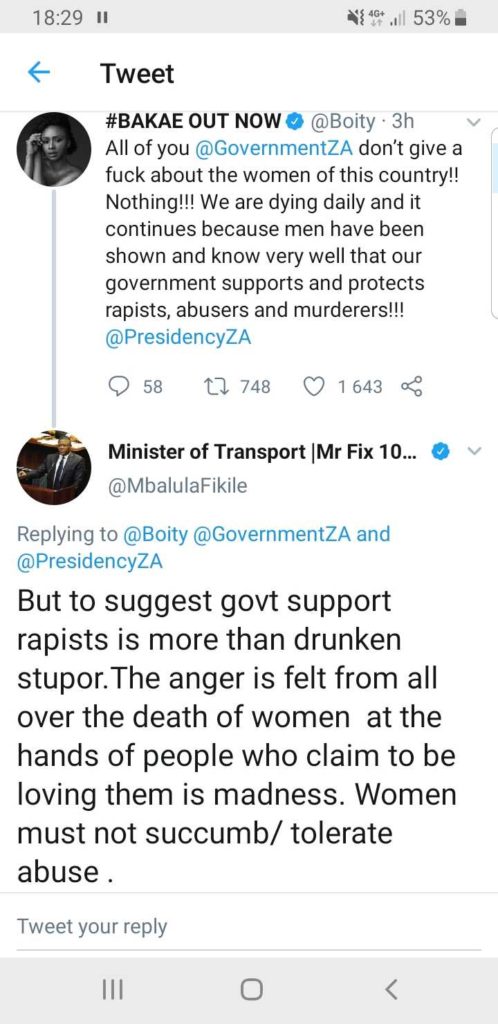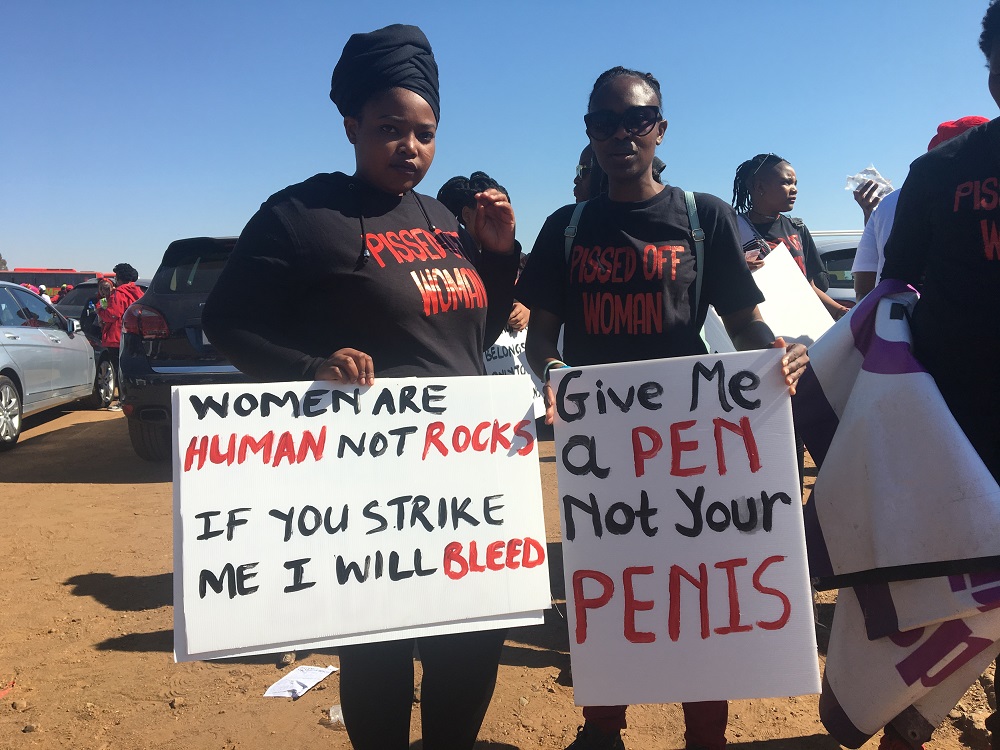NEWS ANALYSIS
The rape and murder of 19-year-old Uyinene Mrwetyana has pushed into the spotlight the government’s failure to deal with gender-based violence (GBV). The rate at which women are being killed has increased in recent years, with some figures showing that a woman is murdered every three hours in South Africa. Yet despite that the government continues to release problematic statements and take no action.
About one year ago, thousands of women and gender non-conforming took to the streets of South Africa. They demanded the government take action against the scourge of gender-based violence. President Cyril Ramaphosa accepted the demands from The Total Shutdown. He convened a national summit on gender-based violence in November 2018.
From the summit, a 16-resolution declaration was signed, including the call for political and community leadership to support the eradication of GBV, the setting up of an interim structure with the objective to establish a national, multi-stakeholder council, and convening a meeting of all communicators on GBV to adopt ethical guidelines for sensitivity.
One of the demands was for the development of a National Action Plan on Gender Based Violence. This plan would be structured through the reviewing of past national action plans to end GBV with a view to understand why they failed. This national strategic plan (NSP) is currently in the consultation stages.
This draft plan is being put together with a steering committee. This committee is made up on The Total Shutdown, civil society organisations, and government. The plan has a compromise plan for fighting gender-based violence. The draft document goes into great detail about the issues surrounding GBV and what are the solutions.
However, despite this plan being drafted, the government seems unable to grasp the gravity of the issue. Following the reports of Mrwetyana’s murder, the national government and several ministers took to social media to speak on the issue. Yet their reasons were problematic and without any understanding of the situation. Rape culture and victim blaming language was used. The statements called on women to stand up against gender-based violence.

Many people in South Africa took to social media to express their disapproval of the way the government handled the recent gender-based violence cases. There were all around calls for more action to be taken. Considering that draft plan it seems like the government is trying to achieve something.
On Tuesday, the minister for women, children and people with disabilities Maite Nkoana-Mashabane held a joint press conference with justice minister Ronald Lamola to “address the nation on the upsurge in the scourge of gender based violence and femicide.”
“In 2019, the Presidency signed the Declaration on Gender-Based Violence and Femicide with various civil society formations and has directed that urgent attention be given to its implementation, particularly on immediate measures around support to victims and access to shelters and places of safety. Following intensive consultations and engagements, we are working toward the establishment of a Gender-based Violence and Femicide Council and a National Strategic Plan that will guide all of us, wherever we are, in our efforts to eradicate this national scourge,” Nkoana-Mashabane said.
Onica Nonhlanhla Makwakwa, a member of the NSP steering committee said to The Daily Vox the plan isn’t a “government” strategy plan. “It’s largely because for the first time this NSP is being developed by both government and civil society,” said Makwakwa. “There have been many NSP around gender-based violence developed by the government. Yet this is the first one that is being developed by civil society.”
There is a NSP from 2014 that called for reducing gender-based violence. This plan was supposed to be carried out from 2015-2020. Civil society organisations have also created their own NSP to tackle the problem. There has been a consistent call from the civil society sector to hold government to account for their failures on GBV. All of this hasn’t yielded any results from the government. With the current draft NSP, it is reportedly a collaboration between civil society and government.
Certain arms of the government, especially those involved with the bureaucracy side of things might be involved in the process. However, judging by the comments from the government and ministers, something is going wrong in the implementation of the policy.
Makwakwa says those “tone-deaf” statements are speak to the core issues they are looking to address with the NSP. One of the core issues is that of coordination. “Yesterday’s response, whether it’s the minister of transport and the government Twitter account clearly all of those speak to the fact that there is no coordinated effort from government,” said Makwakwa.
This is a problem the government has long had with dealing with gender-based violence and many other issues. GBV is relegated to the department of women, children, and persons with disabilities. Yet, the issue of GBV requires a concentrated effort from many different departments like police, health, and education.
Another member of the steering committee, Brenda Madumise-Pajibo said the statements show that most government ministers and officials have not read the summit declaration.
“They don’t know what is in that declaration because if they knew they would not have made the statements they made on Twitter yesterday,” said Madumise-Pajibo. This shows another failure of the government in the fight against GBV.
Madumise-Pajibo said: “Government has not done what it was supposed to do in ensuring that the declaration is understood by those who are charged with the responsibility of prevention-led policies, accountability and leadership.”
With the NSP the steering committee hopes accountability and leadership will take precedent. This means says Makwakwa that people in all structures of government should understand the policies.
“When we speak about police reports, we are already speaking about women who have already been raped. We shouldn’t even get to that point,” said Makwakwa. For both the steering committee members prevention is the core of the plan. While they will focus on providing support for survivors and having more responsive policies, the most important thing is prevention.
“The focus of this NSP is on prevention. We want to end GBV. It’s around changing behaviour and attitudes,” said Madumise-Pajibo.
One of the ways this can happen is through the sex offenders registry. This stems demand number 3 from The Total Shutdown which calls for “the development of criteria and screening for appointing individuals who are tasked with leading efforts to end and respond to GBV.”
Makwakwa said that everyone should is in the employ of government should be run through the registry. “Had that happened consistently (the accused) would not have been employed or he would have been flagged at some point,” said Makwakwa.
For Madumise-Pajibo the NSP is important because for too long the issue of gender-based violence has been a women’s problem.”They have never brought it into their work they do as the minister of transport, as health, mining, as an environment, as rural development,” she said. They hope the NSP will force the government to coordinate in an all-encompassing way.
“What is happening in the country at the moment is underpinned by toxic masculinity which is out in the country at this moment. They are not hearing themselves when they speak. That’s what has created what we are dealing with at this moment,” said Madumise-Pajibo.
The draft NSP has already been created. It is now in the consultation phase. It is being sent around the country for people to look and give their inputs. Once that process is complete, the document will be given to the government to look through. The cost around implementation will need to be found before the solution and proposals found inside can be carried out.
UPDATE: The Interim Committee on Gender-Based Violence and Femicide (GBVF) would like to advise all stakeholders and members of the public that the deadline to submit comments on the Draft National Strategic Framework on GBV and Femicide has been extended to the 18th September 2019.
Members of the public wishing to view and comment on the Draft National Strategic Framework (NSP) are requested to do so by filling the comment form accessed through the following link: Form for inputs on GBVF NSP.
The Draft NSP is available online through the link: Draft NSP.
Madumise-Pajibo said “That NSP is a roadmap for how we end gender-based violence in the country. It must be implemented by every single government department. It can’t only be the responsibility of the department of women.”
The government’s failure to implement previous NSPs does not bode well for this current one. Even with the crisis of gender-based violence at its peak, the government still does not seem ready to act.









